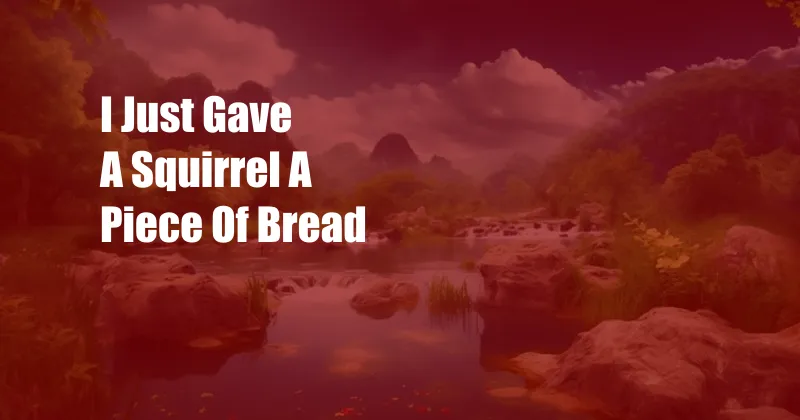
I Just Gave a Squirrel a Piece of Bread: A Tale of Unintended Consequences
As I strolled through the park, enjoying the warm spring breeze, I noticed a tiny squirrel scampering along a tree branch. Its eyes sparkled with curiosity, and its bushy tail flicked nervously. Feeling a surge of compassion, I reached into my pocket and pulled out a piece of bread. With a gentle toss, I sent it towards the squirrel, who eagerly snatched it up in its tiny paws.
The squirrel scampered away, its bushy tail twitching behind it. I watched it with a sense of satisfaction, believing I had done a kind deed. However, as I continued my walk, a nagging thought crept into my mind: had I truly helped the squirrel, or had I inadvertently caused it harm?
The Dangers of Feeding Wildlife
As I delved deeper into research, I discovered that feeding wildlife is generally discouraged. Wild animals are perfectly capable of finding food on their own, and human intervention can disrupt their natural feeding habits. Moreover, certain foods, such as bread, are not suitable for squirrels and can even be harmful.
Bread is high in carbohydrates and low in nutrients, which can lead to weight gain and malnutrition in squirrels. It can also cause digestive problems, such as diarrhea and dehydration. In addition, bread can attract rodents and other predators, which can pose a threat to squirrels and other wildlife.
The Importance of Natural Feeding
Squirrels have evolved to thrive on a diet of nuts, seeds, fruits, and insects. These foods provide them with the essential nutrients they need to stay healthy and strong. By feeding squirrels unnatural foods, such as bread, we are depriving them of the opportunity to maintain a balanced and nutritious diet.
Moreover, feeding squirrels can lead to dependency. Once squirrels become accustomed to human handouts, they may stop foraging for food on their own. This can make them vulnerable to starvation if the food source is removed or becomes unavailable.
Tips for Responsible Wildlife Watching
If you encounter wildlife in the park or other natural areas, it is important to observe them from a distance and avoid feeding them. Here are some tips for responsible wildlife watching:
- Observe wildlife from a distance: Keep a respectful distance from all wildlife, including squirrels, deer, and birds. Avoid approaching them or trying to touch them.
- Avoid feeding wildlife: Refrain from feeding wildlife any type of food, including bread, chips, or pet food. These foods are not suitable for wild animals and can cause health problems.
- Dispose of trash properly: Keep your trash secured in designated containers to prevent attracting wildlife. Leaving food scraps or litter can lead to animals becoming dependent on human handouts or developing unhealthy eating habits.
By following these tips, you can help ensure the well-being of wildlife and maintain the natural balance of the ecosystem.
Frequently Asked Questions
Q: Why shouldn’t I feed squirrels bread?
A: Bread is high in carbohydrates and low in nutrients, which can lead to weight gain and malnutrition in squirrels. It can also cause digestive problems and attract rodents and predators.
Q: What should I do if I see a squirrel in need of help?
A: If you encounter an injured or orphaned squirrel, contact a wildlife rehabilitator or veterinarian. Attempting to care for a wild animal on your own can be dangerous and may not be in the best interest of the animal.
Q: How can I enjoy wildlife without harming them?
A: Observe wildlife from a distance, avoid feeding them, and dispose of trash properly. You can also support organizations dedicated to wildlife conservation and education.
Conclusion
While it may seem like a harmless act, feeding squirrels bread can have unintended consequences for their health and well-being. By understanding the dangers of feeding wildlife and adopting responsible wildlife watching practices, we can help protect these adorable creatures and preserve the delicate balance of nature.
Are you interested in learning more about wildlife conservation and the importance of responsible wildlife watching? Share your thoughts and experiences in the comments below, and let’s continue the conversation about protecting our furry friends.